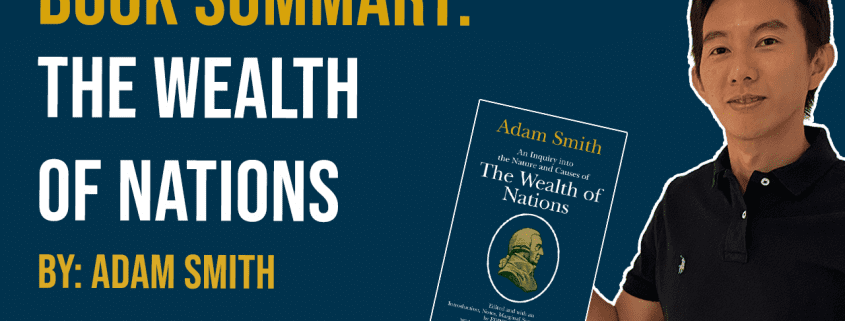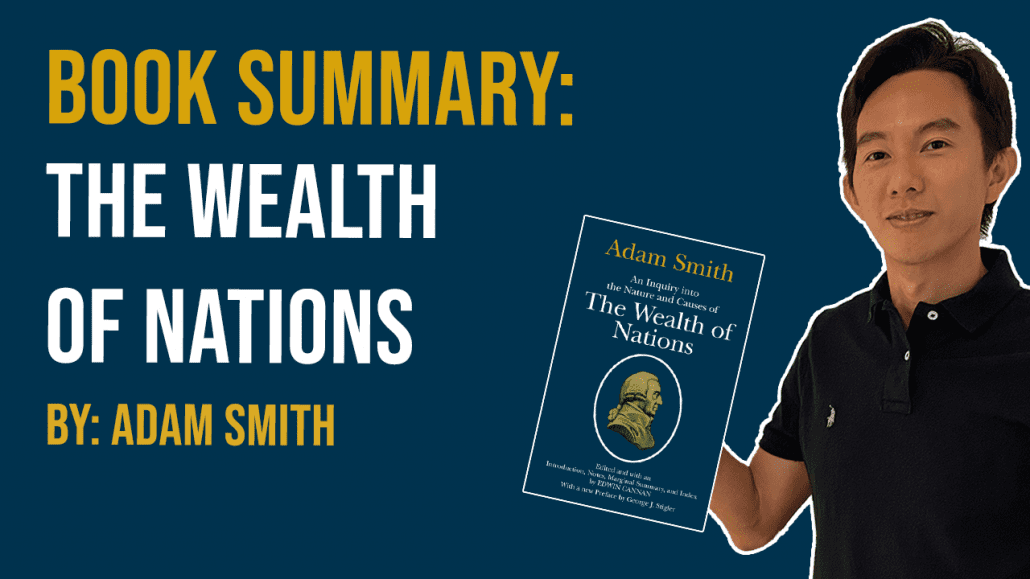Book Summary: The Wealth of Nations by Adam Smith
Join our Telegram channel for more market analysis & trading tips: t.me/synapsetrading
The Wealth of Nations is a landmark work in economics that has had a lasting impact on the field and on society as a whole.
Written by Adam Smith, this book is considered to be one of the foundations of modern capitalism and free market economics.
In this blog post, I will share all about this book and the author, key ideas from the book, and how you can apply it to your own trading & investing journey.
Table of Contents
About the Author
Adam Smith was a Scottish economist, philosopher, and author who is best known for his contributions to the field of economics.
He was born in 1723 and is considered to be one of the pioneers of the discipline. In addition to The Wealth of Nations, Smith also wrote several other influential works such as The Theory of Moral Sentiments.
What is the Book About?
The Wealth of Nations is a comprehensive analysis of the economic system and its role in society.
The main message of the book is the idea of the “invisible hand,” which refers to the idea that individuals acting in their own self-interest can lead to the overall benefit of society.
Smith argued that a free market economy, in which prices are determined by supply and demand rather than government intervention, is the most efficient and fair system.
10 Key Ideas from the Book
Here are 10 key ideas from The Wealth of Nations:
- The division of labor leads to increased productivity: Smith argued that the specialization of labor, in which individuals focus on a specific task, leads to increased efficiency and productivity.
- The role of self-interest in the economy: Smith believed that individuals acting in their own self-interest, rather than being guided by the common good, can lead to the overall benefit of society.
- The importance of the price system: Smith argued that prices, determined by supply and demand, are an effective way to allocate resources and coordinate economic activity.
- The benefits of free trade: Smith believed that free trade, in which goods and services are exchanged freely across borders, leads to increased efficiency and prosperity.
- The role of the government in the economy: Smith argued that the government’s role in the economy should be limited to providing certain public goods, such as defense and the rule of law, and not interfering in the market.
- The role of capital in economic growth: Smith believed that the accumulation of capital, or wealth, is a key driver of economic growth.
- The importance of competition: Smith argued that competition, in which firms compete for customers, leads to lower prices and improved quality.
- The role of wages in the economy: Smith believed that wages, or the compensation received by workers, are determined by the market and are influenced by the supply and demand for labor.
- The importance of education and skills: Smith argued that education and skills are important for individual success and for the overall prosperity of society.
- The role of the market in determining prices: Smith believed that prices are determined by the market, rather than being set by the government or any other authority.
10 Ways to Apply the Teachings
Here are 10 actionable ways to apply what is taught in The Wealth of Nations:
- Specialize in a specific area: Focus on a specific task or industry to increase efficiency and productivity.
- Act in your own self-interest: Consider your own goals and objectives when making decisions, as it can lead to the overall benefit of society.
- Use the price system to make decisions: Consider supply and demand when making economic decisions, such as purchasing goods or selling services.
- Support free trade: Consider the benefits of exchanging goods and services freely with other countries.
- Limit the government’s role in the economy: Support a system in which the government’s role is limited to providing certain public goods, rather than interfering in the market.
- Invest in capital: Consider ways to accumulate wealth and drive economic growth, such as investing in businesses or saving for the future.
- Encourage competition: Support a system in which firms compete for customers, which can lead to lower prices and improved quality.
- Invest in education and skills: Consider the importance of education and skills for individual success and the overall prosperity of society.
- Understand the role of wages in the economy: Recognize that wages are determined by the market and consider the supply and demand for labor when making decisions about compensation.
- Use the market to determine prices: Consider the market when setting prices for goods and services, rather than relying on the government or any other authority.
Other Important Points from the Book
Other points to consider from The Wealth of Nations include:
- The role of entrepreneurship: Smith believed that entrepreneurship, or the act of starting and running a business, is an important driver of economic growth.
- The impact of technological progress: Smith argued that technological progress, or the development of new technologies, leads to increased efficiency and productivity.
- The importance of the financial system: Smith believed that the financial system, including banks and other financial institutions, plays a key role in the economy by facilitating the flow of capital.
- The impact of taxes on the economy: Smith argued that taxes can have a negative impact on the economy by distorting prices and hindering economic activity.
Concluding Thoughts
In conclusion, The Wealth of Nations is a groundbreaking work that has had a lasting impact on economics and society.
Its ideas about the role of the free market, self-interest, and the division of labor are still relevant today and have shaped the economic systems of many countries.
I would recommend this book to anyone interested in economics and the role of the economy in society, as it provides valuable insights and a foundation for understanding modern capitalism.
Now that I have covered all the key learning points of this book, would you consider adding it to your reading list?
For those who have already read it, what are some of your key learning points?
Let me know in the comments below!

If you would like to find more book summaries and recommendations, also check out: “Best Investing & Trading Books of All Time”
 Our flagship mentoring program is suitable for both beginners and advanced traders, covering the 4 strategies which I used over the past 15 years to build up my 7-figure personal trading portfolio.
Our flagship mentoring program is suitable for both beginners and advanced traders, covering the 4 strategies which I used over the past 15 years to build up my 7-figure personal trading portfolio.
 If you're looking for a reputable brokerage that covers all products (SG stocks, US stocks, global stocks, bonds, ETFs, REITs, forex, futures, crypto) and has one of the lowest commissions, this is what I currently use.
If you're looking for a reputable brokerage that covers all products (SG stocks, US stocks, global stocks, bonds, ETFs, REITs, forex, futures, crypto) and has one of the lowest commissions, this is what I currently use.
After trading for 18 years, reading 1500+ books, and mentoring 1000+ traders, I specialise in helping people improve their trading results, by using tested trading strategies, and making better decisions via decision science.






Leave a Reply
Want to join the discussion?Feel free to contribute!